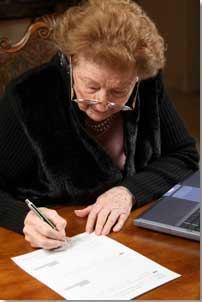Completion requirements
View
Overview

- It is important for adults to plan for the future and state their wishes in writing.
- In the province of Alberta, a personal directive is a document that allows for such advance care planning.
- Personal directives are legal documents which allow adults to name a decision maker and/or provide written instructions to be followed when, due to illness or injury, they no longer have the capacity to make decisions such as where they will live or the medical treatment they will receive.
- Adults need to share their expectations, wishes and values on medical decisions such as end-of-life care and accommodation options with the agent and, if appropriate, with other family members.
- A lawyer can be, but is not required to be, involved in creating personal directives. Sample forms and instructions for their completion are available from the Office of the Public Guardian (see Resources).
- For financial matters it is recommended that the adult also establish an Enduring Power of Attorney.
Introduction

- When adults are healthy and able to think clearly, they should consider setting up a personal directive and Enduring Power of Attorney for future planning and to express their wishes for their care.
- A personal directive is a legal document that allows adults to name someone that they trust to make decisions on their behalf should they lose the mental capacity to do so.
- It allows adults to state what they would want done about personal matters, including medical and residential, in the case of terminal illness, dementia, coma, or stroke.
- These documents make it easier for the agent(s) to make decisions in personal matters when the adult can no longer do so.
- The documents also help the health care team recommend treatments that match the adults's wishes.
- Personal directives also help older people feel confident that future medical decisions will be based on their values, wishes and beliefs.
What You Should Know
Personal Directives

- A personal directive is a voluntary document. It is not necessary to use a lawyer to make a personal directive. There are legal requirements for a personal directive to be valid. Sample forms are available from the Office of the Public Guardian (see Resources).
- A personal directive states a person's wishes about personal, non-financial matters including medical care. It is used if, at some time in the future, the person is unable to make decisions about personal matters. The personal directive includes the name of someone (an "agent") who has the authority to make these decisions.
- A copy of the personal directive should be kept by the agent and shared with the family physician. The personal directive should also be shared with the healthcare team if the adult is admitted to a hospital or a long-term care facility. This way, health care staff will be aware of the patient's wishes if he or she cannot speak for themselves.
Selecting an Agent
- The adult can identify their agent in their personal directive. It should be someone they trust to make decisions on their behalf.
- It is best that the agent be someone that understands their values and beliefs and will act in their best interests.
- Adults usually select a family member or a close friend as an agent.
- It is advised that the person selected feels comfortable serving as an agent.
- Generally speaking, people with dementia retain their ability to name an agent well into the illness. However, this is not always the case, so advance planning is always the better option.
Issues to Discuss
A personal directive gives the adult an opportunity to discuss advance planning and goals of care.
The adult should be encouraged to discuss questions such as the following with their agent, family member and caregivers:
- Would the person want to receive artificial nutrition at the end of life?
- Would they want to be on a respirator (breathing machine) if they were unlikely to recover or in a permanent coma?
- If they had a terminal illness, would they want medical treatments to prolong life or only medicines to remain comfortable?
- What would they like in terms of supports to continue to live in their own home or alternatives if that becomes too risky.
Enduring Power of Attorney
- Arrangements should also be made for financial affairs by establishing an Enduring Power of Attorney. A trusted family member or friend can be chosen to assist with financial decisions. This allows the designated person, known as the "attorney", to make decisions about financial matters or property on the family member's behalf while that person is still alive but unable to make such decisions on their own.
- The Enduring Power of Attorney is a separate legal document and is not part of the personal directive.
- If there is a significant estate or if there is family discord, this should be prepared with the help of a lawyer. However, in clearer situations, standard templates can be used.
Guardianship and Trusteeship
- Guardianship (personal matters) and trusteeship (financial matters) come into play when someone is no longer capable of making independent decisions and there are no advance directives, such as a personal directive and Enduring Power of Attorney, in place. When this situation occurs, guardianship and/or trusteeship must be obtained through the courts.
- Assistance is available for families/caregivers who need to make these types of arrangements from community agencies, homecare and social workers if the adult is in hospital or continuing care.
Capacity
- What is capacity? Having capacity means you can understand information important for making a decision and can appreciate the consequences of that decision.
- When should capacity be assessed? Generally, adults are assumed to have the capacity to make their own decisions. A capacity assessment is only initiated if there is reason to believe an adults is unable to conduct his/her personal affairs.
- You can have capacity to make certain types of decisions but not others. For example, a diagnosis of dementia does not automatically mean lack of capacity. A person with dementia may retain the ability to make personal decisions until well into their illness, but lose their financial reasoning quite early, or vice versa.
- Who assesses capacity? A physician, psychologist or healthcare professional trained in capacity assessment.
See Also
While the content of each Caregiver College Topic may be linked to a variety of other Topic areas, the following has been identified as a Key Linkage which you may be interested in also reviewing:
Resources
- Alberta Human Services:
- information on guardianship and trusteeship under the 2009 Adult Guardianship and Trusteeship Act (AGTA)
Last modified: Wednesday, 27 April 2022, 9:00 AM

